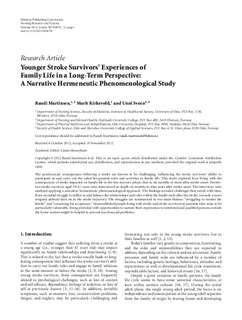Younger Stroke Survivors’ Experiences of Family Life in a Long-TermPerspective: A Narrative Hermeneutic Phenomenological Study
Peer reviewed, Journal article
Permanent lenke
http://hdl.handle.net/11250/134456Utgivelsesdato
2012Metadata
Vis full innførselSamlinger
Originalversjon
Martinsen, R., Kirkevold, M., & Sveen, U. (2012). Younger Stroke Survivors’ Experiences of Family Life in a Long-Term Perspective: A Narrative Hermeneutic Phenomenological Study. Nursing Research and Practice.Sammendrag
The psychosocial consequences following a stroke are known to be challenging, influencing the stroke survivors’ ability to participate in and carry out the taken-for-granted roles and activities in family life. This study explored how living with the consequences of stroke impacted on family life in the late recovery phase, that is, six months or more after stroke onset. Twentytwo stroke survivors aged 20–61 years were interviewed in-depth six months to nine years after stroke onset. The interviews were analyzed applying a narrative, hermeneutic phenomenological approach. The findings revealed challenges that varied with time, from an initial struggle to suffice in and balance the relationships and roles within the family early after the stroke, towards a more resigned attitude later on in the stroke trajectory. The struggles are summarized in two main themes: “struggling to reenter the family” and “screaming for acceptance.” Nonestablished people living with stroke and stroke survivors in parental roles seem to be particularly vulnerable. Being provided with opportunities to narrate their experiences to interested and qualified persons outside the home context might be helpful to prevent psychosocial problems.
Beskrivelse
This article can also be read here: http://www.hindawi.com/journals/nrp/2012/948791/
